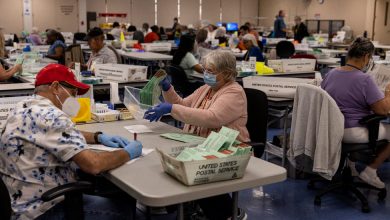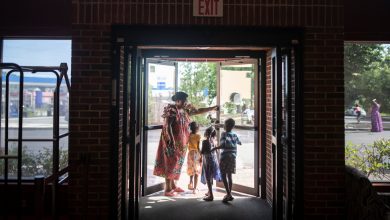Supreme Court Rejects Bail Hearings for Jailed Immigrants

WASHINGTON — The Supreme Court ruled on Monday that a federal law does not require that immigrants detained for long periods while they are fighting deportation be granted hearings to decide whether they may be released on bond as their cases move forward.
The ruling will affect thousands of immigrants detained for many months while their cases are decided by immigration courts facing long backlogs.
Seven justices joined Justice Sonia Sotomayor’s majority opinion, which was tightly focused on the words of the relevant statute. Justice Stephen G. Breyer issued a partial dissent.
The court did not consider what the Constitution has to say about the extended detentions of immigrants, leaving that question for another day.
The case concerned Antonio Arteaga-Martinez, a citizen of Mexico who has repeatedly entered the United States unlawfully, fleeing what he said was gang violence against him and his family. After he was arrested in 2018, an asylum officer made a preliminary finding that he had a reasonable fear of persecution if he was returned to Mexico.
Mr. Arteaga-Martinez was detained while he waited for an immigration judge to consider his request to halt his deportation. After four months without a hearing, he challenged his detention in federal court, saying that an immigration judge should decide whether he should be released while his case moved forward because he was neither a flight risk nor a danger to the community.
Lower courts ruled in his favor. The U.S. Court of Appeals for the Third Circuit, in Philadelphia, said that immigrants in Mr. Arteaga-Martinez’s position were entitled to bond hearings after six months of detention.
Read More About U.S. Immigration
- At the Southern Border: Amid a historic spike in migrant crossings, a Times photographer documented three ways that people traverse from Mexico into the United States.
- Border Agents: In a 6-to-3 decision, the Supreme Court made it harder to sue federal officials for money in cases accusing them of using excessive force.
- Expulsions: In May, the Biden administration accelerated the expulsion of Haitians. The uptick rekindled criticism that the government treats Black migrants more harshly than others.
- A Shift in California: Farmers in the Golden State are turning to workers on seasonal visas and relying less on illegal immigration, while mechanizing what they can.
An immigration judge ordered his release. The federal government sought Supreme Court review, saying that the governing statute did not require bond hearings before immigration judges.
Justice Sotomayor agreed, writing that “there is no plausible construction of the text” of the statute at issue “that requires the government to provide bond hearings before immigration judges after six months of detention, with the government bearing the burden of proving by clear and convincing evidence that a detained noncitizen poses a flight risk or a danger to the community.”
She added: “On its face, the statute says nothing about bond hearings before immigration judges or burdens of proof, nor does it provide any other indication that such procedures are required.”
The federal government is free to provide bond hearings, Justice Sotomayor wrote, but it is not required to do so by the statute in question.
The statute was the subject of a 2001 decision, Zadvydas v. Davis, which held that the government may not detain immigrants indefinitely if no country is willing to take them. If deportation was not likely in the “reasonably foreseeable future,” Justice Breyer wrote for the majority in the 5-to-4 decision, immigrants must be released unless there was a good reason to detain them.
On Monday, Justice Sotomayor wrote that lower courts should consider whether the Zadvydas decision helped Mr. Arteaga-Martinez.
In a concurring opinion, Justice Clarence Thomas wrote that “we should overrule Zadvydas at the earliest opportunity.”
In a partial dissent, Justice Breyer wrote that “Zadvydas controls the outcome here” and urged the lower courts to rule that it requires the bail hearing requested in the case, Johnson v. Arteaga-Martinez, No. 19-896.
A second case decided on Monday, Garland v. Gonzalez, No. 20-322, ruled on a related question, saying that detained immigrants could not band together in class actions to seek injunctions requiring periodic bond hearings.
Justice Samuel A. Alito Jr., writing for the majority, said that a federal statute did not allow lower federal courts to issue injunctions granting relief to an entire class of plaintiffs.
Justice Sotomayor, in a partial dissent, wrote that the majority opinion would deprive detained immigrants of meaningful access to the courts.
“The ramifications of the court’s errors should not be ignored,” she wrote. “Today’s holding risks depriving many vulnerable noncitizens of any meaningful opportunity to protect their rights.”
It makes no sense, she wrote, to require individual court challenges.
“Class litigation not only enables individual class members to enforce their rights against powerful actors,” she wrote, “but also advances judicial economy by eliminating the need for duplicative proceedings pertaining to each class member.”
Justice Elena Kagan joined all of Justice Sotomayor’s partial dissent, and Justice Breyer much of it.



